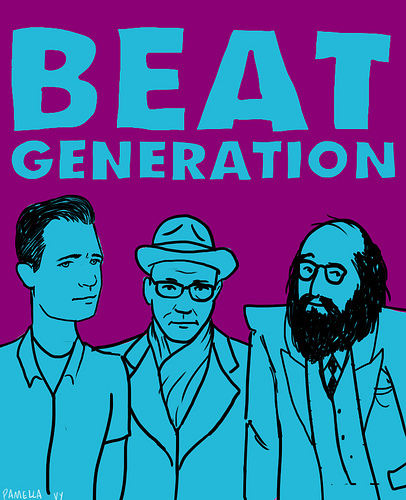The revolutionary wave of unprecedented opening-up of national borders all over the world reverberates with a strangely familiar rhythm – is the Beat back in the game or was it never quite out of it?

America in the early 50’s: Ronald J. Oakley calls it the “God’s Country” and at least on the face of it, it looks like he’s right – every family owns at least one car; items previously seen as luxuries – washing machines and air conditioning – have become the norm.
But even in the Garden of Eden seasons change, and as fall comes, the leaves of material prosperity fall off, leaving the bare trunks of festering social wounds on display – the Cold War and the McCarthy Era that followed it continued to claim victims, but not just physically. The “natural and inalienable right to freedom” was at stake, and, as on so many other historical occasions, art, with its intrinsic sensitivity, took the lead of expressing the public discontent.
Calling someone a “beatnik” in those troubled times, was nothing short of a mockery – the suffix “nik” had a direct association with the Soviet “sputnik” evoking bitter American prejudice. Before long however, the liberal attitudes of the Beat Generation, together with its passionate rebellion against all norms of society and the arts, would ignite the spark of freedom from the pages of its books that would soon become classics.
The fire of the Beat Generation found the oxygen it needed to burn in the face of Columbia University in the City of New York. It was there, amidst its atmosphere of freedom and cultural boom, that the energetic founders of the Beat movement – Jack Kerouac, Allen Ginsberg, Neal Cassady, Bill Burroughs, Lucien Carr, Hal Chase and their spectacular girl friends Joan Vollmer and Edie Parker – met for the first time. In the modest apartment of the two girls the accelerating wave of spiritual conversations, philosophy, literature, jazz and banned substances was born and pretty soon it would break its gray walls, sweep onto the streets of New York, and flood the highways of Louisiana, Texas and Colorado on the way to its dream destination – the ocean of freedom in the bars and galleries of downtown San Francisco.
The beatniks needed the road just like Sartre needed the cafés of Paris – only there is there enough room for the Philosophy of life to expand to its fullest extent. Being faced with the boundless American land one can awaken to their true selves and to the fact that although we are just a speck in the immensity of time – “We know time” (“On the Road: the Original Scroll”) – we have the power, energy, love and freedom to change the world and even stop the wise but ruthless time from running, because art is beyond time and life. It is everywhere around us – in the peaceful sites of the fragrant vineyards of the South, in the tireless labor of the North Dakota reapers, in the worn tires of a car purring down the highway, even in the road markings along it. For art is the road marking of our confusing world of numberless highways and it makes sure we will never get lost.
Do not believe the apocalyptic stories about the decline of the Beat Generation – about the wretched demise of Kerouac and Burroughs, and even Ginsberg, but mostly of Cassady – lost along a railroad track somewhere in Mexico, drunk and alone. Do not believe the myths of how the Beat movement has been assimilated by the hippie culture or by Kesey’s “Merry Pranksters”. Do not label “On the Road,” “The Dharma Bums,” “Naked Lunch” or “Howl” as “scandalous, but sadly – obsolete literature.” Open the window of your room, open it as wide as you can, and let the flavorful breath of fall seize your senses. Now listen to the world outside – amidst the boom of performing arts, bioengineering, high speed Internet and technology in the year 2011, doesn’t the human urge for freedom sound like a Charlie Parker’s bebop song or a Neal Cassady’s love story?
Photo: Pamela Vieyra











No comments so far ↓
Nobody has commented yet. Be the first!
Comment